6 Best Cat DNA Tests of 2025
Updated on April 24, 2024
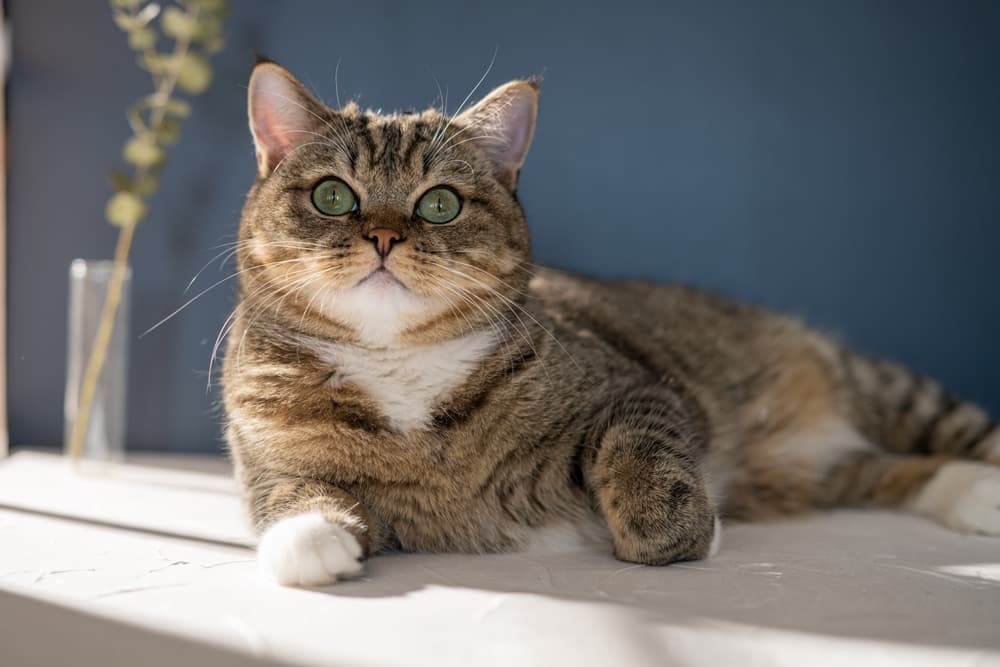
A cat DNA test can be an invaluable tool for pet parents wanting an in-depth look at their cat’s risk for genetic diseases. And for those of us with catchall domestic short- and long-haired cats, attempting to trace our cat’s ancestral roots can be downright fun.
With ongoing advancements in technology, DNA testing doesn’t stop at analyzing your cat’s genetic makeup; some tests even screen your cat for bacteria responsible for common oral diseases.
But at-home feline DNA testing might not hold all the answers, experts say. Here’s the realistic scoop on what you can learn about your favorite feline through home DNA testing, plus how to choose the right cat DNA test kit based on the information you’re searching for.
Our Picks
All featured products are chosen at the discretion of the Vetstreet editorial team and do not reflect a direct endorsement by the author. However, Vetstreet may make a small affiliate commission if you click through and make a purchase.
- Best Overall: Basepaws Breed + Health Cat DNA Test
- Best Cat DNA Test for Breed Analysis: Wisdom Panel Complete for Cats
- Best Cat DNA Test for Health Risks: Orivet Health Screen & Life Plan
- Best Cat DNA Test for Gut Health: KittyBiome by AnimalBiome
- Best Budget-Friendly Cat DNA Test: My CatScan
- Best Cat DNA Test for Breeders and Purebreds: CatDNATest.org
6 Best Cat DNA Tests of 2025
All featured products are chosen at the discretion of the Vetstreet editorial team and do not reflect a direct endorsement by the author. However, Vetstreet may make a small affiliate commission if you click through and make a purchase.
The best cat DNA test for you and your feline friend depends on what information you’re after. Here are six at-home cat DNA tests to consider.
Best Overall
Our pick: Basepaws Breed + Health Cat DNA Test
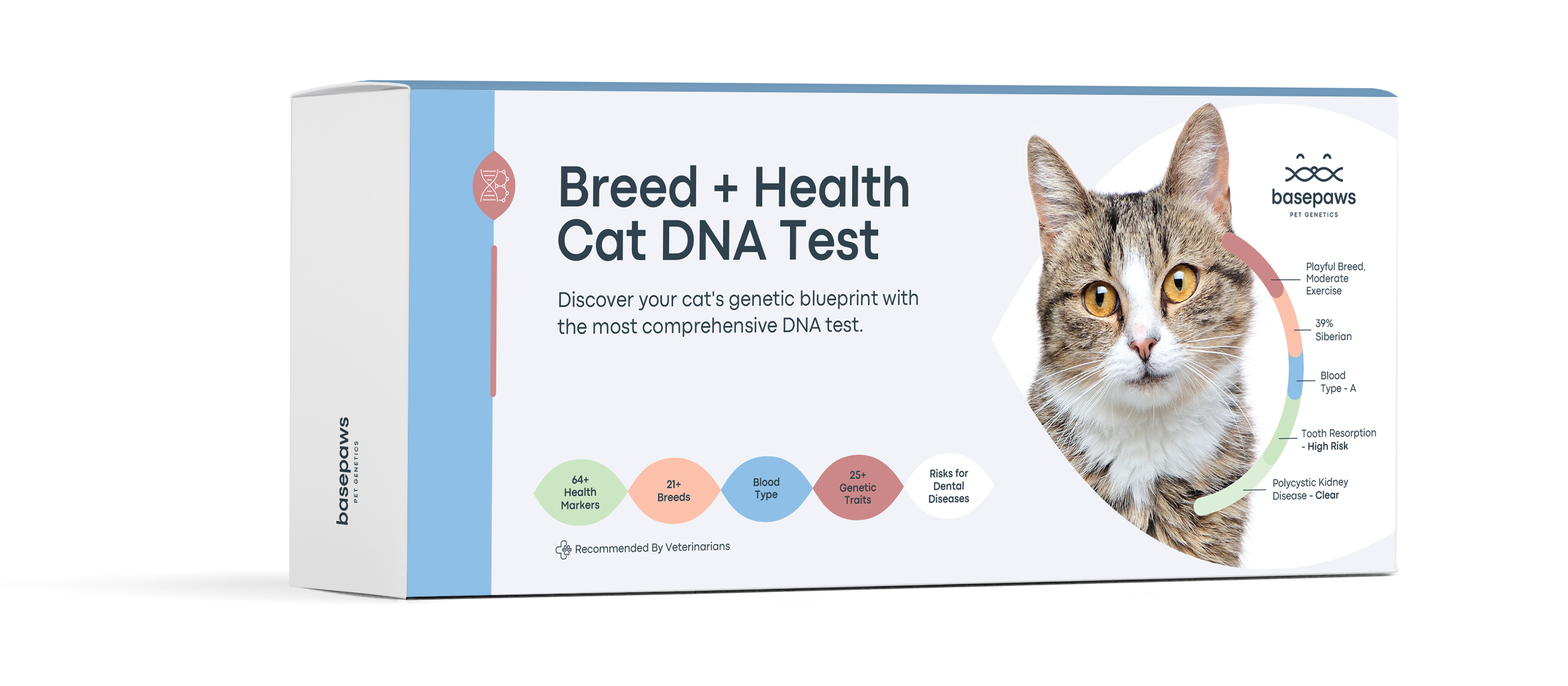
Basepaws earns our top-rated spot for at-home cat DNA testing for their commitment to research and their robust health, trait, and microbiome reports. To test cat DNA, they collect cheek swabs, which means they have a lot of oral microbiome data at their fingertips, Dr. Bell explains. Instead of throwing away the information, Basepaws extracts the bacteria for useful percentage reporting on common oral diseases. And that’s just a small portion of the complete DNA report; pet parents also unlock breed composition, 43 genetic diseases based on 64 genetic markers, and 25 traits based on 50 markers.
Basepaws is widely trusted and recommended by veterinarians, including Dr. Bell, who describes the company as being at the forefront of cat DNA testing and research. To further their research goals, Basepaws asks pet parents to participate in citizen research and has partnered with reputable veterinary clinics and universities.
Pros
- Veterinarian recommended
- Easy to use, submit, and read results
- Analyzes 21 pedigree breeds within four regions, and checks for 43 genetic diseases based on 64 genetic markers, 25 traits based on 50 markers, and 3 oral diseases
- Pet parents receive automated updates to their cat’s original genetic report as Basepaws’ database and reference list expand, at no additional cost
Cons
- Priced at $159 for one test, Basepaws is the priciest cat DNA test on our list
- Basepaws says the results of the test will be delivered in four to six weeks, but some pet parents note that it can take longer
Best Cat DNA Test for Breed Analysis
Our pick: Wisdom Panel Complete for Cats
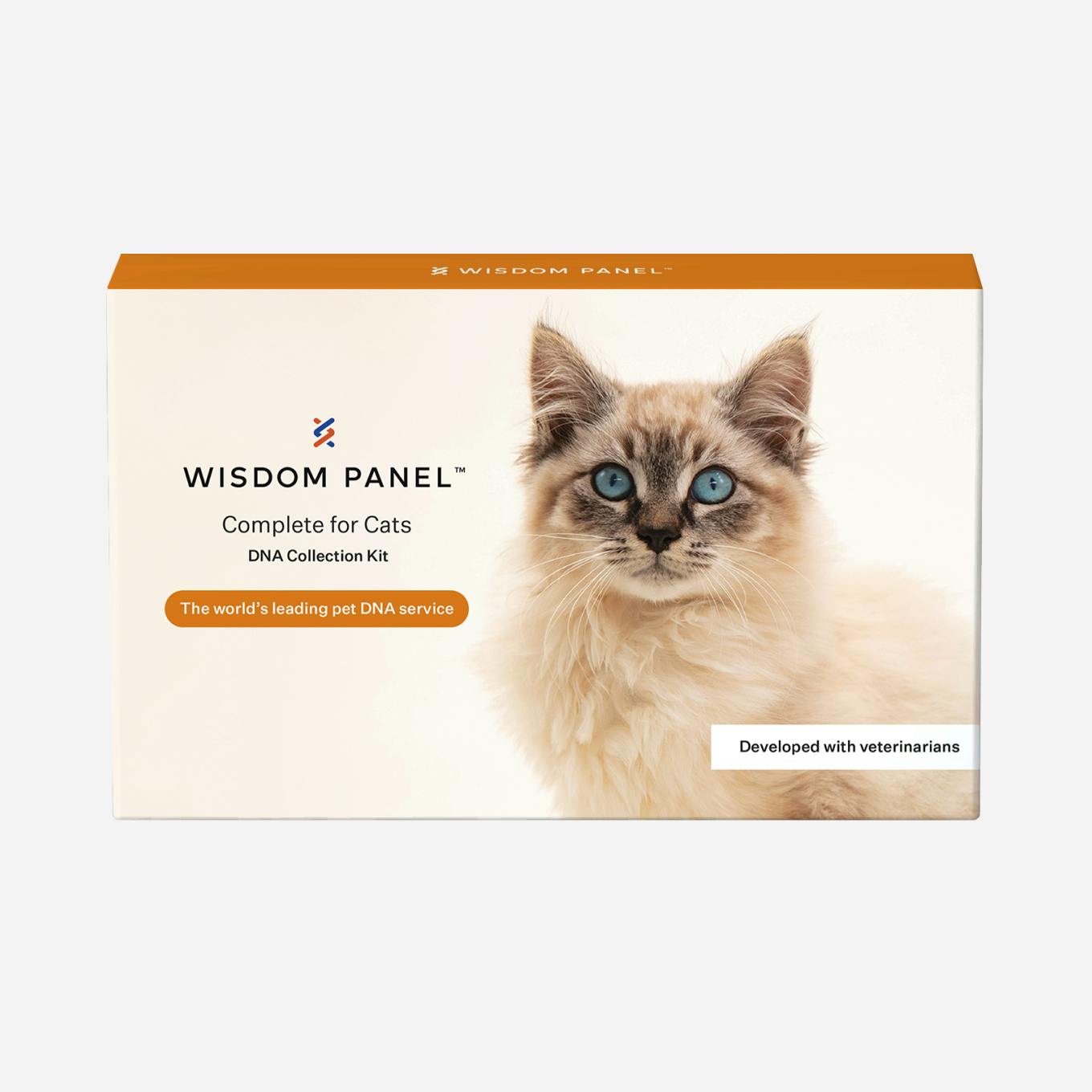
It’s no secret that when it comes to cat breeds out there, it’s a real mixed bag. That’s why, if you’re specifically looking for a cat breed test, it’s important to choose one that has access to the largest breed database. The Wisdom Panel Complete kit screens for 70+ breeds and population types, providing the most robust look at your cat’s potential breed composition. Plus, the test provides helpful health information, like blood type and testing for 45 genetic health conditions and 25+ traits.
Pros
- Analyzes over 70 reported breeds and population types
- Utilizes a cheek-swab sample
- Easy-to-use companion application
- To ensure quality control, Wisdom Panel processes their tests in a USDA-accredited laboratory
Cons
- Results can take three weeks or longer
- At-home DNA kits offering a look at your feline’s family tree are fun, but experts say that analyzing a cat’s breed makeup isn’t as straightforward as reporting a mixed-breed cat
Best Cat DNA Test for Health Risks
Our pick: Orivet Health Screen & Life Plan

According to Dr. Bell, testing your cat’s DNA for health risks is only the first step in taking a hands-on approach to their health. “We need the veterinarian in the loop,” he says. We love that Orivet seeks to partner with veterinarians by developing a personalized LifePlan. Based on your cat’s genetic results, age, gender, weight, and geographic location, Orivet’s LifePlan lays out recommended care intended for you and your veterinarian to put into practice together. For cat parents seeking a collaborative approach to care, this is the cat DNA test for you.
Pros
- Checks for 40+ genetic diseases and traits
- Comes with a personalized LifePlan for a hands-on approach to cat wellness
- Uses a cheek-swab sample
Cons
- Breed analysis isn’t included in the test. According to the company, the test is designed for purebred cats, domestic short-haired cats, and domestic long-haired cats only
- Dr. Bell notes that Orivet doesn’t conduct their own research, but they do utilize the results and research of other companies and universities
Best Cat DNA Test for Gut Health
Our pick: KittyBiome by AnimalBiome
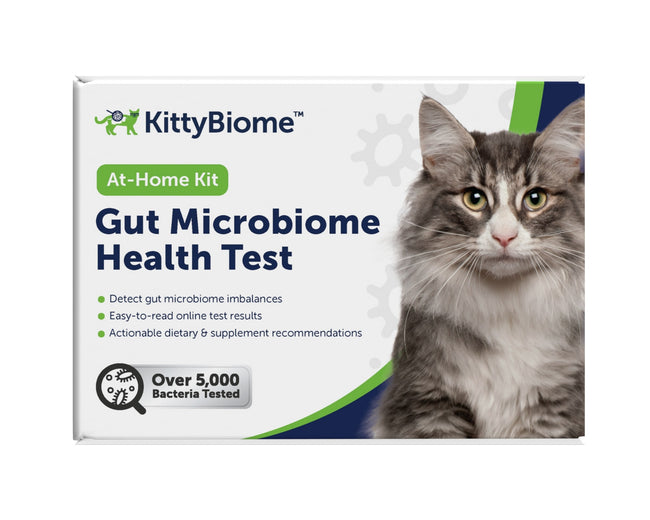
Instead of testing your cat’s DNA, this at-home kit uses fecal matter to test the DNA living inside your cat’s gut. It provides valuable information about the bacteria in your cat’s system. And according to experts, an imbalance or the wrong type of bacteria could contribute to gastrointestinal disease, poor oral health, allergies, diabetes, difficulty managing weight, and other conditions [4].
Results of the microbiome test include a breakdown of the types of bacteria in your cat’s sample, along with how the values compare to a healthy reference set, which was established in 2015. Over 1,500 feline fecal samples were collected from cats of all breeds who consumed a range of commercial diets and varied in age and living conditions [5].
Plus, if your cat’s results indicate an imbalance, AnimalBiome has their own line of prebiotics and probiotics to get your kitty back on track — just be sure to talk to your veterinarian before adding any supplements to your cat’s diet.
Pros
- Tests bacterial DNA for gut microbiome composition
- Compares sample to an established healthy reference set
- AnimalBiome has a line of cat prebiotics and probiotics available if needed
Cons
- Requires at-home fecal sample collection
Best Budget-Friendly Cat DNA Test
Our pick: My CatScan

Choosing a budget-friendly cat DNA test kit doesn’t mean sacrificing results. The My CatScan at-home kit screens for 80+ genetic diseases and traits for under $100. The test won’t identify what breed of cat you have. But it can be used for all cats, regardless if you know their breed or not (just select “domestic cat” when placing your order). The best part? Results are delivered straight to your online portal in two weeks or less.
Pros
- Screens for 80+ genetic diseases and traits
- Available for under $100
- Uses a cheek-swab sample
- My CatScan employs on-staff geneticists, veterinarians, and technicians, including a board-certified geneticist certified by the American Board of Medical Genetics
- Test results are delivered to your online account within 14 days of the lab receiving your sample
Cons
- My CatScan can be used for any breed of cat, but it isn’t a breed identification test. If you’re looking to learn more about your cat’s ancestry, this isn’t the cat DNA test for you
Best Cat DNA Test for Breeders and Purebreds
Our pick: CatDNATest.org

This DNA test for cats isn’t for the everyday curious cat parent. Instead, CatDNATest.org, powered by Neogen labs and in partnership with the Cat Fanciers’ Association (CFA), offers an uber-specific (and affordable) DNA test for breeders and cat fanciers. It focuses on specific inherited diseases, parentage, and probable traits. It won’t tell you what breed your cat is; that’s for you to tell them. But “you will know what mutations are specific for your breed,” Neogen’s on-staff veterinarian explains. Plus, there are a few extra breed-specific mutations available for a small upcharge, including polycystic kidney disease, hypertrophic cardiomyopathy, and color points.
Pros
- Trusted and in partnership with the CFA
- Offers specific results for cat breeders and fanciers: genetic health testing for already-known breeds and provides information on a breed’s physical traits, inherited diseases, and parentage (to avoid inbreeding)
- $45 for the basic test makes it one of the most affordable tests on the market
Cons
- This test won’t tell you what breed of cat you have
- The test results are limited, but there’s the option to add spinal muscular atrophy ($15) and/or polycystic kidney disease, blood type, hypertrophic cardiomyopathy, or color points ($5 each) to the basic test
- Sample collection supplies don’t come with the kit. Instead, the company provides instructions for gathering materials including cotton swabs and paper envelopes
Cat DNA Test Kit Buying Tips
There are no federal regulations or established quality controls for feline DNA testing [6]. By considering these factors when purchasing, you can feel confident the company is doing what they say they will in an ethical manner.
Privacy protection. Privacy protection is a huge question when it comes to DNA testing in humans. And as small pet DNA testing companies are being bought by big names like Zoetis and Mars, pet parents should be asking what’s happening with their pet’s DNA, too. So, look for a clear privacy policy and an option to opt in or out of future research using your cat’s DNA.
Collaboration with universities, colleges, and other veterinary research institutions. By purchasing a cat DNA test that is associated or collaborates with reputable institutions, “you’re helping to put money back into the research,” Dr. Lyons says.
Cat DNA Test FAQs

Pet DNA testing is a relatively new field that’s growing rapidly. Here are some frequently asked questions and answers to familiarize yourself with the process.
How accurate are cat DNA tests?
According to Dr. Bell and Dr. Lyons, to be accurate means to correctly analyze and report the traits (phenotype) or diseases associated with a genetic sequence. The accuracy of DNA testing is very high, they say. “However, the large panels have an error rate because the technology has an error rate,” Lyons adds. The laboratory itself might be doing everything correctly, but the technology has about a 5 percent error margin.
For pet parents like you and me, we might ask if a DNA test can accurately predict if a cat will develop a flagged hereditary disease during their lifetime. This is called penetrance and is a genetic counseling question that pet parents should be asking their veterinarian and/or the genetic testing company, Dr. Bell says.
As for correctly assessing the breed composition of our beloved felines, that’s not so straightforward. “People think they’re going to get an answer that my cat is a bunch of mixed breeds, and that’s just absolutely not true,” Dr. Lyons says. “Random-bred cats are truly random.”
“Cats are not small dogs,” adds Dr. Annette Louviere, DVM at Wisdom Health Genetics. And while that might seem obvious, the difference in ancestry between dogs and cats might not be. Dogs have been selectively bred for thousands of years, while the breeding of cats was left up to natural selection. “Cat breeding as we know it today didn’t really begin in earnest until roughly 150 years ago. And much like their breeding history, ancestry testing for cats tends to be in its early stages when compared to dogs.”
How much do cat DNA tests cost?
The price for at-home cat DNA test kits ranges from $45 to upward of $159. Basic tests detect genetic traits and a handful of common genetic diseases, while more elaborate tests screen for 40+ genetic diseases and provide a breakdown of breed composition.
The most expensive DNA kit for cats on the market is the Basepaws Whole Genome Sequencing, priced at $499. This test offers a look at your cat’s entire genome sequence and a one-hour consultation with a Basepaws veterinarian and genetics advisor. Dr. Lyons notes that the advancements in feline genetics are exciting, but to proceed with caution—scientists haven’t yet defined the error rate for commercially available whole genome sequencing.
How do you interpret the results of a cat DNA test?
Working with your veterinarian is the most effective way to interpret the results of your cat’s DNA test and develop a health plan that suits her needs. Whichever test you choose, share and discuss the results with your veterinarian.
If a genetic disease pops up in your results, get a second opinion. “That’s what we do in human medicine and that’s what we should do in veterinary medicine, too,” Dr. Lyons says. She recommends seeing your veterinarian for a targeted DNA test or purchasing an at-home DNA test unrelated to your first results.
Cat DNA: Understanding the Basics
In 2004, the Human Genome Project set out to create what cat lovers didn’t know we wanted: a genetic map of the domestic cat. Three years later, we met a 4-year-old Abyssinian named Cinnamon — and about 80 percent of her genetic sequence [1].
According to Dr. Jerold Bell, DVM, adjunct professor of genetics at Tufts University’s Cummings School of Veterinary Medicine, your cat is one-of-a-kind, but her genetic makeup varies very little compared to other cats. “About 90 percent of all domestic cat DNA is exactly the same,” explains Bell. This means that Cinnamon paved the way to understanding all domestic felines better.
The DNA of your cat isn’t so different from yours, either, adds Dr. Leslie Lyons, Ph.D., a Gilbreath-McLorn endowed professor of comparative medicine at the University of Missouri. “Cat DNA is so structurally similar to humans, we basically have all the same genes,” she says. “They have slight DNA differences because one is a cat and one is a human, but we have all the same genes that make our eyes, face, and body.”
What is a Cat DNA Test?
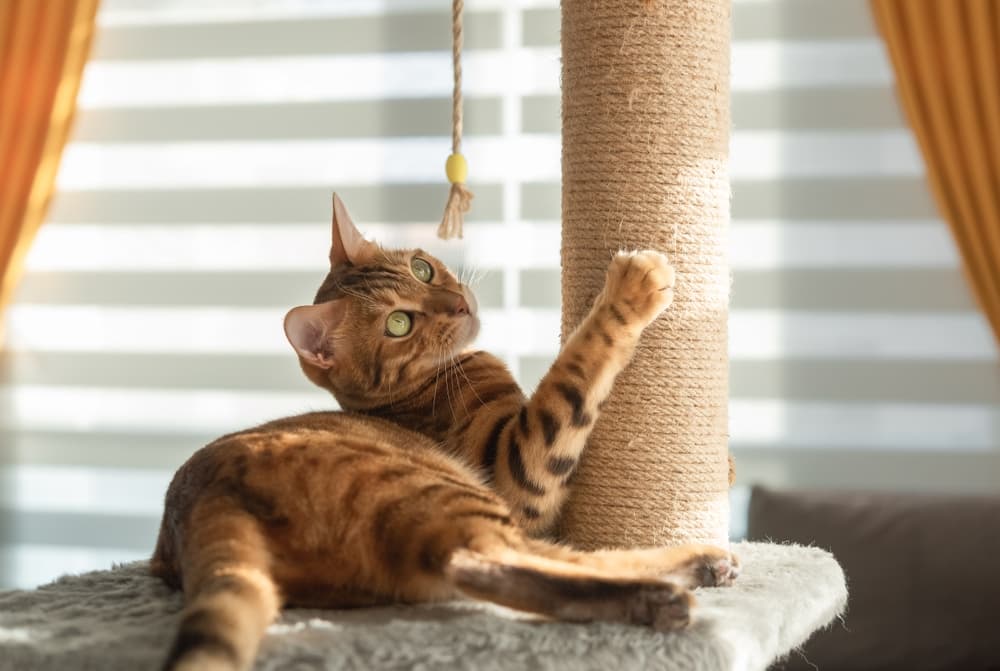
Cat DNA (and human DNA) is made up of four “bases”: A, G, C, and T. The order of the bases determines how genes behave or indicates mutations. Basically, they’re the blueprint for your cat; they determine anything from fur length to the number of toe beans to the chances of a genetic disease popping up during their lifetime [2].
Cat DNA tests use a sample collected from your cat to discover the order of these bases; a process called sequencing. To sequence DNA, genetic material is extracted from cells within the sample. Once extracted, it’s cut into smaller pieces and mapped [3]. Then, it’s compared to an in-house database of other DNA sequences and/or to publicly available DNA sequences, like Cinnamon’s.
Not all DNA tests for cats look for the same information or provide the same results. Most tests on the market ask for a swab of saliva and in return, they’ll provide a glimpse into your cat’s ancestral roots, genetic traits, and/or potential health conditions. Others aren’t interested in your cat’s DNA; they’ll sequence the DNA of the bacteria in your cat’s poop or saliva for valuable information.
Dr. Lyons says that genetic testing at your veterinarian’s office is like at-home tests — they’ll typically collect a cheek swab and test the DNA using the same methods commercial labs do. Blood DNA tests are typically reserved for bacteria-free whole genome sequencing, which isn’t likely in a clinic setting. Instead of running an entire panel like commercial tests, geneticists look at particular locations for a specific disease or two. When asking my local clinic about genetic testing for cats, they noted it wasn’t common practice.
How to Use a Cat DNA Test Kit
At-home cat DNA tests typically come with the supplies needed to gather, preserve, and send the sample to the lab. Most cat DNA test kits utilize easy-to-use oral swabs, and the steps for sample collection are generally the same:
- Register your test tube’s serial number.
- Remove the swab, avoiding touching the collection tip. If your cat has recently eaten, it’s recommended to wait 30 minutes to an hour before collecting the sample.
- Rub the inside of your cat’s cheek, tongue, or gums with the collection end of the swab for about 10 to 15 seconds. Rather than prying a cat’s mouth open, most swabs can slide into the cheek pouch.
- Secure the swab in the provided test tube, bag, or container. Seal and ship it to the testing company.
Unless otherwise noted, samples remain stable when shipped. If the test collects other forms of samples like fecal matter, you’ll want a pea-sized amount that hasn’t been in the litter box for long.
How We Selected Our Top Picks
I considered several important factors and sources when compiling our list of the best cat DNA test, including:
Expert opinions. I asked the experts in feline genetics for their thoughts, opinions, and expertise, including Dr. Lyons and Dr. Bell. I also went straight to the source, gathering insight from the cat DNA companies themselves.
Personal experience. I’ve used cat DNA tests on my own cats, so I took the knowledge I gained during each process into consideration as well.
Reviews. Lastly, I scoured the internet for cat DNA test reviews and testimonies from other pet parents in order to ensure a well-rounded view of each option.






